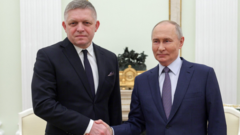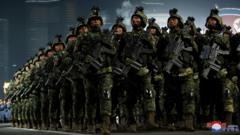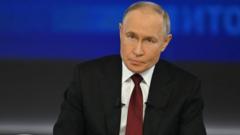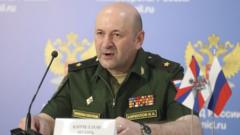A Ukrainian operative group has taken responsibility for the assassination of Russian General Igor Kirillov in Moscow, marking a significant escalation in military actions within Russian territory. This killing is seen as a tactical move by Ukraine against Russian military leadership, raising concerns about possible retaliatory actions from the Kremlin.
Assassination of Russian General Marks Turning Point in Ukraine Conflict

Assassination of Russian General Marks Turning Point in Ukraine Conflict
The assassination of General Igor Kirillov in Moscow by Ukrainian operatives highlights the intensifying conflict between Ukraine and Russia amid growing hostilities.
In a dramatic escalation of hostilities in the ongoing Ukraine-Russia conflict, a bomb exploded on a Moscow street yesterday, killing Russian General Igor Kirillov and an aide. Ukraine has claimed responsibility for the assassination, a bold move amidst an increasingly aggressive campaign against Russian military officials since the onset of the full-scale invasion nearly three years ago.
Igor Kirillov, who was 54 years old, held the position of head of Russia's radioactive, chemical, and biological defense forces. The attack utilized an explosive device concealed in a scooter, detonated in the morning hours. Ukrainian officials had recently accused Kirillov of orchestrating the "massive use of banned chemical weapons" against Ukraine, further justifying their decision to target him directly.
This is not the first instance of Ukraine carrying out targeted operations against Russian forces; a car bombing in Crimea last month killed a senior Russian commander, and there have been various other incidents resulting in lower-ranking officials being targeted. However, the assassination of Kirillov stands out as it marks the death of the highest-ranking military official on Russian soil since the war began, indicating a possible new phase in Ukraine's strategic approach.
The assassination may destabilize the broader geopolitical landscape, with U.S. officials expressing concern over the implications of the action. An unnamed senior American official stated that the U.S. was not forewarned about the assassination and warned that it might provoke a significant and aggressive response from President Vladimir Putin.
Amidst this context of rising tensions, reports have emerged regarding the involvement of North Korean forces in the conflict, who are said to be suffering casualties as they support Russian military operations. With the potential shift in U.S. military support under the looming presidency of Donald Trump, the unfolding events could signify a watershed moment in ongoing international relations around the troubled region.






















